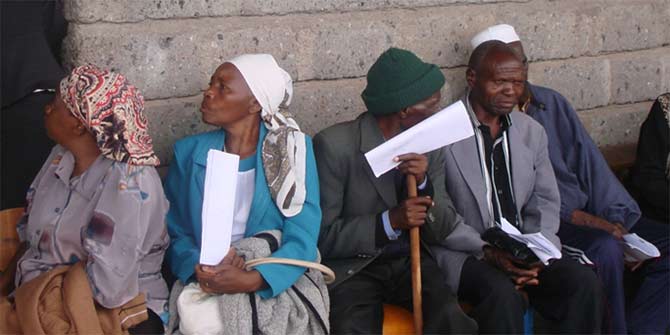As tech solutions by African entrepreneurs are replicated globally, Nwamaka Ogbonna points out the missing piece in the continent’s bid to leapfrog development.
Economists hardly agree on anything but if there is one thing most of them agree on, it is that technology and innovation are critical for economic growth and development. This perhaps explains why the latest innovations out of Africa have led many to believe that through technology, Africa can ‘leapfrog’ its development. Indeed, the signs are encouraging – the phenomenal rise in tech hubs across the continent and the innovations developed by young African entrepreneurs have driven this narrative. Stories such as the bloodless malaria test invented by a 24-year-old young Ugandan entrepreneur; or the famous M-Pesa – a mobile payment platform that has revolutionised the transfer and receipt of money, are visible testimonials of Africa’s nascent technological rise.

These developments are remarkable not just because young Africans are providing local solutions to Africa’s problems, but because these technology solutions can replicated all over the globe. M-Pesa, for instance, has been adopted in several countries across Asia and eastern Europe. Global technology giants are taking notice – Google, Microsoft and Facebook are investing in African start-ups and launching new programmes to tap into this emerging pool of talent. Therefore, it is not hard to see why this leapfrogging narrative has become predominant.
Upon closer scrutiny however, I have observed a common thread among the latest technological innovations – that they are bottom-up solutions driven by individual entrepreneurs – often achieved despite the government. This is remarkable and entrepreneurs should be encouraged to continue pushing the frontiers on innovation. However, this is a unique difference between the technological progress in Africa and that of now advanced countries and other emerging regions. In other countries where technology has been used to leapfrog development, the governments were just as vested in fostering innovations as were the individual entrepreneurs. In other words, it was a top-down and as well as a bottom-up approach.
Take a look at Britain during the industrial revolution, this period saw an unprecedented rise in the volume of inventions, from the steam engine to electricity, power loom, machine tools etc. Indeed, this is commonly known but what is less discussed is the critical role the government played in enabling these inventions. They financed large scale investments in railroad, steel manufacturing, sponsored technological acquisition and invested in research and development by establishing universities, technical schools and science academies. It is this top-down role of the government in leapfrogging development that Africa largely lags and it shall be the greatest determiner of whether technology can enable Africa leapfrog development or not.
Africa’s infrastructure deficit is well documented, the African Development Bank (AFDB) estimates that it would cost $93 billion dollars for Africa to fix its infrastructure deficit. Beyond the obvious benefits that infrastructure provides such as better connectivity and increased access to markets; the capabilities that society acquires through infrastructure projects are relevant for any attempts to leapfrog development. According to the late Harvard Professor, Calestous Juma, “Infrastructure projects are inherently technological in nature -they represent bundles of scientific and technical knowledge embodied in both equipment and human capabilities”. He argues that infrastructure projects provide Africa the opportunity to build the engineering and managerial capabilities needed to design, maintain and construct infrastructure projects.
Therefore, the idea that Africa can leapfrog development without making commensurate investments in infrastructure is at best laughable and at worst naive. Indeed, the experience of many e-commerce start-ups illustrates the necessity for this. Africa needs urgent investments in transport, energy and telecommunications infrastructure.
Similarly, investments in research and development needs to be increased as Africa lags behind in global investments in research and development (R&D). According to the UNESCO Institute for Statistics, sub-Saharan Africa spends only 0.4 per cent of its regional GDP on research and development and accounts for only 1.1 per cent of world researchers. This is in sharp contrast with other emerging regions such as East Asia and the Pacific which spends 2 per cent of their GDP on R&D and accounts for 38.5 per cent of the world researchers. To illustrate this gap, Nigeria, for instance, has only 38 researchers per million inhabitants while the United States has 4231 researchers per million inhabitants – this is over 100 times the number of Nigeria.
Because R&D enables the adaptation of technology to the local context, like governments, businesses need to invest in it. In India for instance, business accounts for 36 per cent of total R&D expenditure while in China this figure increases to 77 per cent. Therefore, given the limited resources of government, Africa can use foreign investments to boost R&D; to do so however – they need to pay closer attention to the quality of FDI that the continent receives and more critically, the R&D component of these investments.
R&D matters a lot, more so as technology rapidly accelerates. A report by Chatham House advises that it is important for governments to invest in developing and retaining home-grown talent and expertise in artificial intelligence (AI) to reduce dependence on dominant AI technology most concentrated in the US and China. This advice applies to other technologies besides AI as failure to do so could further reinforce the north-south technological divide. Indeed, this is why Google’s decision to locate its AI research centre in Ghana is of significant importance.
In conclusion, technology has immense potential to enable Africa solve its myriad of development challenges. However, to truly leverage technology to leapfrog its development – African governments must prioritise infrastructure and R & D investments.
Nwamaka Ogbonna (@amaka_og) is an LSE alumna and an LSE PfAL Fellow. In 2017, she was recognised by the British Council as one of the 50 emerging Policy leaders from across the world. Read more of Nwamaka’s policy views on her blog.
The views expressed in this post are those of the author and in no way reflect those of the Africa at LSE blog, the Firoz Lalji Centre for Africa or the London School of Economics and Political Science.





